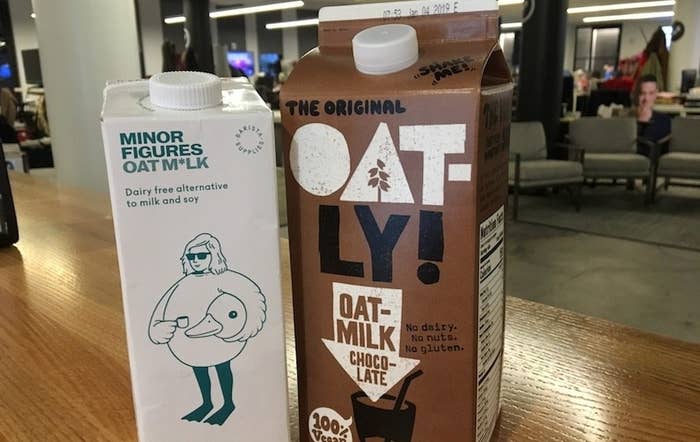
What is oat milk?
Oat milk seemed to make a dramatic debut in the last year, winning hardcore fans among vegans, the allergy-prone, the lactose intolerant, and other people who don't eat dairy. Other popular nondairy alternatives include soy and almond milks, of course, as well as pea, banana, cashew, coconut, hemp, flax, and probably a bunch of other milks we forgot to mention and you can remind us about in the comments.
Oat milk is a vegan drink that you can either buy or make yourself. The simplest version is made from whole oats soaked in water, placed in a blender, then strained.
But how does oat milk nutrition stack up against the competitors? We talked to registered dietitians Cynthia Sass, a board-certified sports and performance nutritionist based in New York and Los Angeles, and Vandana Sheth, a spokesperson for the Academy Of Nutrition and Dietetics.
First up, know that it’s hard to compare the nutrition of different types of milk because there are so many brands and varieties — sweetened, unsweetened, fortified, flavored, and more. So, to get the final word on how one type compares to another, you’ll have to read the label.
You can use the USDA Branded Food Products Database to find the nutrition details on a bunch of different foods. For this article, we looked at unsweetened versions of most milks.
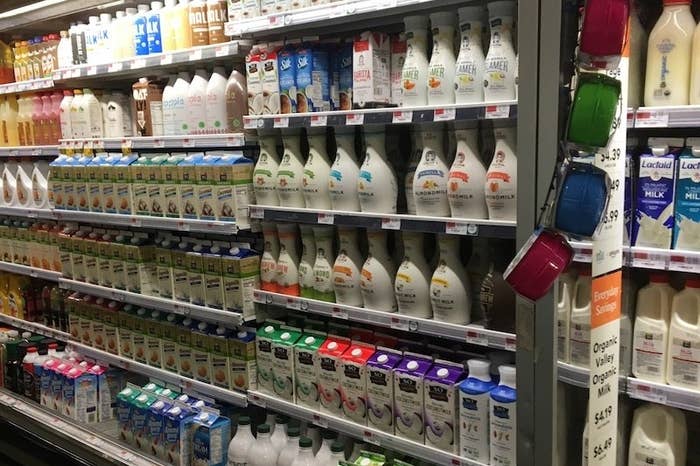
Why is oat milk popular?
Oat milk isn’t really new, even if it wasn’t on your radar until recently. It’s been around for years. One reason for the surge in interest was due to clever marketing by the Swedish company Oatly.
“Oatly has done a very good job in launching their brand, which I think has raised new awareness about oat milk,” Sass said.
Oatly was founded in the 1990s, but started marketing its product in the US in late 2016 in specialty coffee shops, which gave it an air of exclusivity. It only became available in grocery stores in early 2018.
“Coffee shops were selling it over the counter with like a black market for oat milk because it wasn’t available anywhere, which was amazing,” said Mike Messersmith, the New York–based general manager for Oatly. “We were like, okay, well maybe we should start selling it in grocery stores.”
There are other brands, too, like Elmhurst and Pacific Foods. You can now find oat milk at FreshDirect, ShopRite, Target, Wegmans, Whole Foods, and on Amazon, among other places.
But it's often in short supply. There was no unflavored oat milk at my local Whole Foods, so I bought the chocolate version.
“We’ve had so much enthusiasm, way exceeding what we ever imagined,” said Messersmith. “On a day-to-day basis if you were going to visit one of these stores, we hope you will find it fully stocked, with shelves teeming with oat milk, but that isn’t always the case.” To meet the demand, the company is ramping up production and opening a new manufacturing facility in early 2019, he said.
If you are a DIY type, you can try this oat milk recipe or this almond milk recipe.
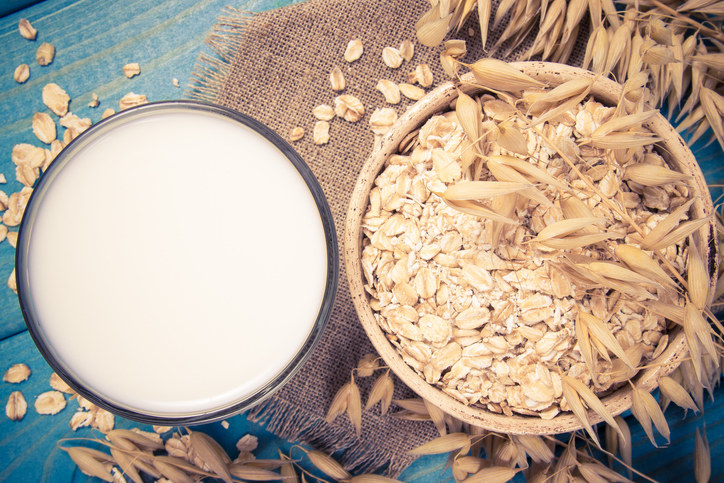
How much protein is in oat milk?
Oat milk provides more protein than some types of milk, and less than others.
It contains about 3 grams of protein in a 1-cup serving, compared with 8 grams in cow’s milk and 7 or 8 grams in soy milk. It also “does not contain all nine essential amino acids, which soy and dairy do,” Sheth said.
Pea milk also has more protein than oat milk, Sass noted. “[Pea milk] is high for a plant milk, on par with cow's milk,” she said.
However, oat milk contains more protein that almond, rice, or coconut milk, which all contain 1 gram or less per cup.
“if you're replacing cow's milk, which provides about 8 grams of protein per cup, with oat milk, which provides about 3 grams protein per cup, you may want to make up that protein from another food, such as a quarter cup of nuts or pumpkin seeds or a hard boiled egg,” Sass said.
How many carbohydrates are in oat milk?
If you keep an eye on your carbohydrate intake, you should know that oat milk has more carbs than some other milks. “It is definitely higher in carbs compared to cow’s milk or other nut milks,” said Sheth.
The unsweetened version contains about 16 grams of carbs per cup, said Sass. “So it's higher in carbs than, say, unsweetened almond milk, which typically provides 1 gram of carb per cup,” she said. (For comparison, cow’s milk has about 11 to 13 grams of carbs per cup and soy milk has 3 to 15 grams, depending on the type.)
Carbs can provide energy and other benefits, though, so if that’s what you want, it might be just the thing for you.
“Because it does provide more carbs without being sweetened, I do recommend it pre-exercise, either in coffee or a smoothie,” Sass said.
How many calories are in oat milk?
A few calories here or there generally don’t make that much of a difference, but FYI, here are the details.
One cup of unsweetened oat milk is about 120 calories, compared to about 30 to 40 calories in almond milk.
In contrast, a cup of whole cow’s milk has 150 and the skim version of cow’s milk has 90 calories. The unsweetened version of soy milk has roughly 70 calories per cup, flax milk has 25 to 60, coconut milk has 45, and pea milk has 70. Again, check the label, because it can vary.
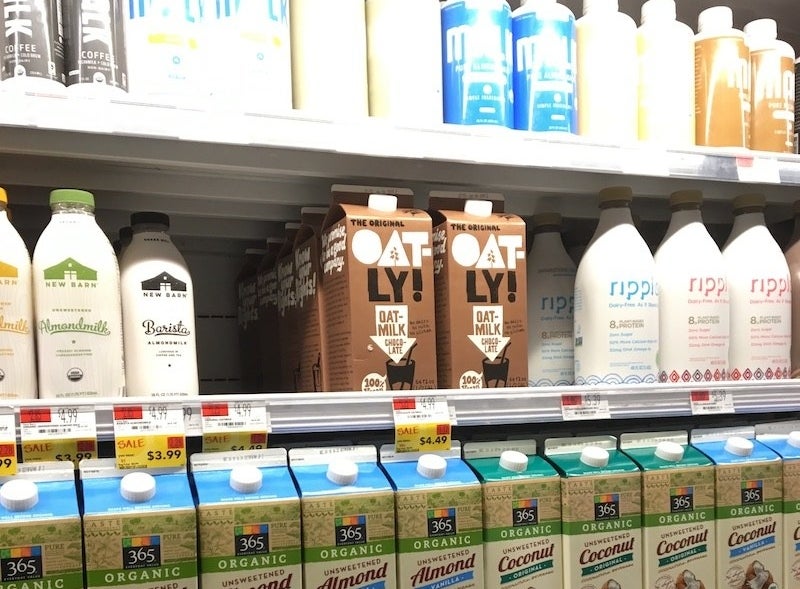
How much fiber is in oat milk?
If you're looking to get more fiber, milk is probably not the food you should be relying on. But oat milk does have some.
“Oat milk also retains some of the healthful fiber found in oats, although it only supplies about 2 grams per cup,” said Sass. (The recommended intake of fiber is at least 25 grams a day for adults.)
Pea milk, flax, almond, cashew, hemp, coconut, soy, and cow’s milk all have 1 gram of fiber or less per cup.
But seriously, does oat milk taste better than other nondairy milks?
You know, taste is highly personal. What we like may not be the same thing that you like. But at one point we did a taste test of nondairy milks — not all of them, mind you, but some of the biggies — and oat milk did come out the winner.
Oat milk “gets great reviews for flavor and creaminess,” Sass said.
Sheth agreed that it holds up pretty well in that department.
“It does have a richer, creamier texture and can be easier to incorporate instead of almond milk,” she said. “It works well when cooking or baking with it.”
I tried the chocolate milk version, and compared it with a chocolate-flavored pea milk. They both were pretty damn good, and tasted similar to each other and to chocolate cow's milk. But you know, chocolate milk — it’s all good. You’ll have to try them and decide for yourself.
Is oat milk good for people with nut allergies? Is it gluten free?
This is one area where oat milk is a winner. If you can’t do dairy because you are allergic or choose not to drink it, or if you have a soy or nut allergy that rules out almond or soy milk, then you might want to consider oat milk.
“The main advantage of oat milk is that it's nut-free, because many people also struggle with nut allergies or intolerances,” Sass said.
Oats are naturally free of gluten, and Oatly’s milk is indeed gluten-free. (Keep in mind that if you eat other oat-based products, like oatmeal, always check the label. Even though oats don’t naturally contain gluten, not all oat products are gluten-free because they are sometimes processed along with wheat products.)
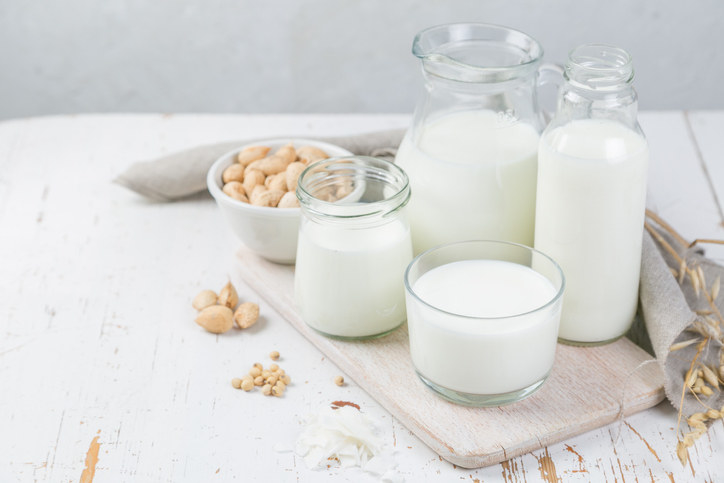
Is oat milk good for you?
Many nondairy milks have nutrients added, like calcium, vitamin D, and vitamin B12. If you are switching from cow's milk to a plant-based milk, look for brands that supply a comparable amount of these nutrients.
Most types of cow’s milk are fortified with vitamin D in the US, which is a good thing because it essentially wiped out rickets in the country. (Rickets can happen in children who have a vitamin D deficiency, and it causes bowed legs and abnormal bone growth, so it’s an important vitamin, particularly for kids.)
And vitamin B12 is naturally found only in animal products, so if you are a vegan, supplementing with vitamin B12 is a good idea.
“When you pursuing a vegan diet It’s hard to get some of those vitamins and minerals through other consumptions and so we fortify with the vitamin and mineral blend just to be able to help them out,” said Messersmith.
Oatly's fortified oat milk contains (among other things) vitamin D (20% of the daily value versus 25% in cow’s milk); calcium (25% versus 30% for cow’s milk), and vitamin B12 (50% versus 18% in cow’s milk), although not as much protein and more carbs than some other milks.
However, the company isn’t really trying to match the nutritional profile of dairy or other milks, Messersmith said.
“At the end of the day, Oatly was founded to try to help accelerate the adoption of a plant-based diet, which is really good from a sustainability and climate change perspective,” he said.
